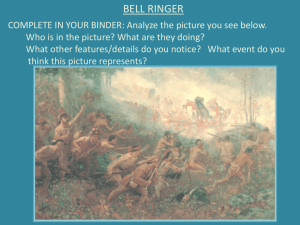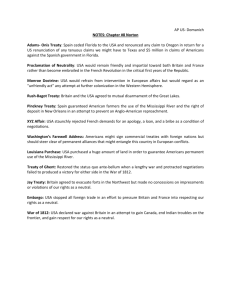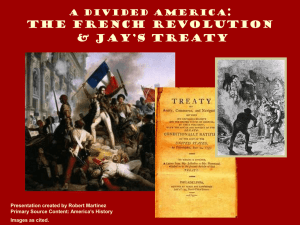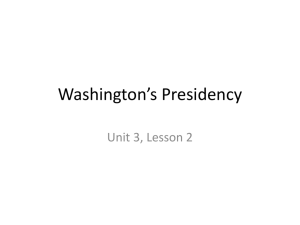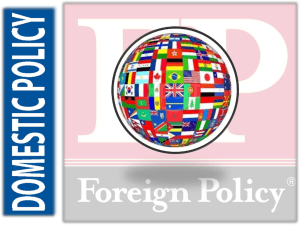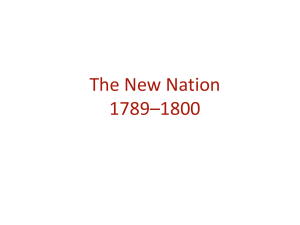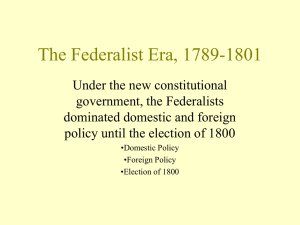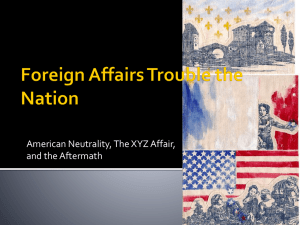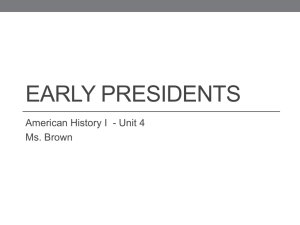1. Domestic Affairs George Washington's presidential inauguration
advertisement
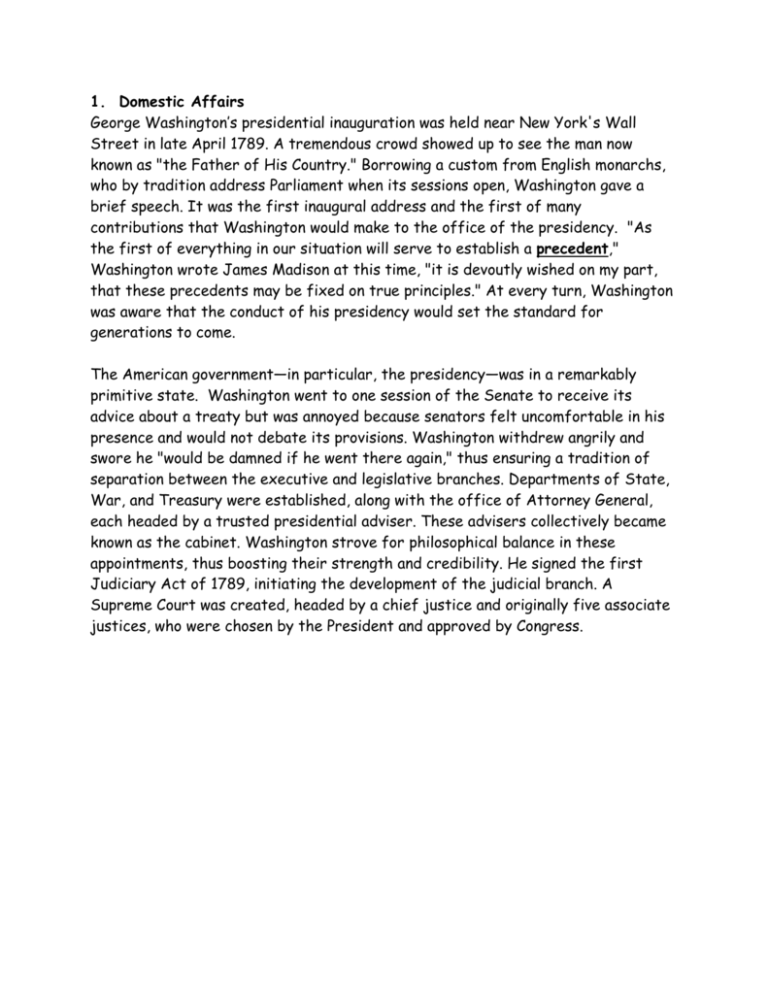
1. Domestic Affairs George Washington’s presidential inauguration was held near New York's Wall Street in late April 1789. A tremendous crowd showed up to see the man now known as "the Father of His Country." Borrowing a custom from English monarchs, who by tradition address Parliament when its sessions open, Washington gave a brief speech. It was the first inaugural address and the first of many contributions that Washington would make to the office of the presidency. "As the first of everything in our situation will serve to establish a precedent," Washington wrote James Madison at this time, "it is devoutly wished on my part, that these precedents may be fixed on true principles." At every turn, Washington was aware that the conduct of his presidency would set the standard for generations to come. The American government—in particular, the presidency—was in a remarkably primitive state. Washington went to one session of the Senate to receive its advice about a treaty but was annoyed because senators felt uncomfortable in his presence and would not debate its provisions. Washington withdrew angrily and swore he "would be damned if he went there again," thus ensuring a tradition of separation between the executive and legislative branches. Departments of State, War, and Treasury were established, along with the office of Attorney General, each headed by a trusted presidential adviser. These advisers collectively became known as the cabinet. Washington strove for philosophical balance in these appointments, thus boosting their strength and credibility. He signed the first Judiciary Act of 1789, initiating the development of the judicial branch. A Supreme Court was created, headed by a chief justice and originally five associate justices, who were chosen by the President and approved by Congress. 2. Battle of Fallen Timbers In 1791, Washington learned that an American force had been defeated by a Native American uprising, led by Little Turtle in the Northwest Territory (present-day Ohio). This attack killed over 600 American soldiers and militia. British troops in the area supported the Native American resistance and white settlers were often attacked. The President ordered the Revolutionary War veteran General "Mad" Anthony Wayne to launch a new expedition against a coalition of tribes led by Miami Chief Little Turtle. Wayne spent months training his troops to fight using guerilla warfare in the style of the Indians before marching boldly into the region. After constructing a chain of forts, Wayne and his troops crushed the Indians in the Battle of Fallen Timbers (near present-day Toledo) in the summer of 1794. Defeated, the seven tribes—the Shawnee, Miami, Ottawa, Chippewa, Iroquois, Sauk, and Fox—ceded large portions of Indian lands to the United States and then moved west. Meanwhile, John Jay had been negotiating with Britain over disputed land west of the Appalachians. When the Fallen Timber victory reached Britain, they agreed to give up claims in the Northwest Territory and evacuate their posts. Treaty passes in the Senate but many Americans are unhappy that the British are still able to maintain their fur trade on the American side of the U.S.-Canadian border. 3. Debts and Finances The young country had severe financial problems. There were both domestic and foreign debts from the war, and the issue of how to raise revenue for government was hotly debated. Treasury Secretary Alexander Hamilton laid plans for governmental financing via tariffs, or surcharges on imported goods, and a tax on liquor. Much of this revenue was earmarked for retiring war debts. Hamilton also proposed a national bank to centralize the nation's financial base and urged the new government to assist in developing a manufacturing sector of the economy. He traded his support for Secretary of State Thomas Jefferson's plan to locate the nation's permanent capital near Virginia, with Philadelphia serving as a temporary capital, for Jefferson's support of his policies on retiring the debt. By the midpoint of Washington's first term, however, such cooperation had deteriorated. Washington's administration had split into two rival factions: one headed by Jefferson, which would later become the Democratic-Republican Party, and the Federalist faction headed by Hamilton. They disagreed on virtually all aspects of domestic and foreign policy, and much of the President's energies were spent in mediating their differences. 4. War Over Whiskey A excise tax on whiskey—production of which had increased dramatically in the 1790s—was one of the key elements of Alexander Hamilton's fiscal program. This taxation enraged many small frontier farmers, and in 1794, resistance to the whiskey tax boiled over in western Pennsylvania with attacks on tax collectors and the formation of several well-armed resistance movements. Washington was alarmed by the Whiskey Rebellion, viewing it as a threat to the nation's existence. In a move designed to demonstrate the federal government's preeminence and power, the President ordered 15,000 militiamen from several other states into Pennsylvania to keep order. He then traveled to the site of the troubles to personally oversee the buildup of troops and to lend his encouragement to the enterprise. The insurrection collapsed quickly with little violence, and the resistance movements disbanded. Later, Washington pardoned the men convicted of treason in the matter. 8. Farewell to Office Although it was his for the taking, Washington never considered running for a third term. Over four decades of public service had left him exhausted physically, mentally, and financially. He happily handed the office to his successor, John Adams. With customary care, Washington was scrupulously silent on his opinions of the men jockeying to succeed him. By ceding office after two terms, Washington helped ensure a regular and orderly transfer of executive power. His two-term limit set a custom that would stand for a century and a half, until Franklin Roosevelt was elected to a third term in 1940 and a fourth term in 1944. Washington closed his administration with a thoughtful farewell address. Written with the help of Hamilton and Madison, the address urged Americans to be a vigilant and righteous people. "It is of infinite moment that you should properly estimate the immense value of your national union to your collective and individual happiness," he said. "The very idea of the power and the right of the people to establish government presupposes the duty of every individual to obey the established government." It was as if he saw the great challenges to come in the next decades and begged his fellow citizens to remain a unified nation. But some of Washington's advice was not heeded. He warned his fellow citizens against "the baneful spirit of faction," referring to the party spirit that had disrupted his administration, and he warned against "foreign entanglements." But he could not prevent the formation of parties, nor did his warning against "foreign entanglements" prevent his successors from engaging in active diplomacy with European nations, often leading to actual alliances. To this day, Washington's farewell address is read aloud every year in the U.S. Senate as a tribute to his service and foresight. 5. French Revolution In 1789, the French Revolution sent shock waves across the Atlantic. Many Americans, mindful of French aid during their own struggle for independence, supported returning the favor. At the same time, the British were once again inciting Native Americans to attack settlers in the West, hoping to destabilize the fledgling Republic. American anger in response to these attacks served to reinforce sentiments for aiding France in any conflict with Great Britain. Washington was leery of any such foreign entanglement, considering his country too weak and unstable to fight another war with a major European power. His insistence on neutrality in foreign quarrels set another key precedent, as did his insistence that the power to make such a determination be lodged in the presidency. Within days of Washington's second inauguration, France declared war on a host of European nations, England among them. Controversy over American involvement in the dispute redoubled. The Jefferson and Hamilton factions fought endlessly over the matter. The French ambassador to the U.S.—the charismatic, audacious "Citizen" Edmond Genet—had meanwhile been appearing nationwide, drumming up considerable support for the French cause. Washington was deeply irritated by this subversive meddling, and when Genet allowed a French-sponsored warship to sail out of Philadelphia against direct presidential orders, Washington demanded that France recall Genet. 6. British Challenges In mid-1793, Britain announced that it would seize any ships trading with the French, including those flying the American flag. In protest, widespread civil disorder erupted in several American cities. By the following year, tensions with Britain were so high that Washington had to stop all American shipments overseas. Six large warships were commissioned; among them was the USS Constitution, the legendary "Old Ironsides." An envoy was sent to England to attempt reconciliation, but the British were now building a fortress in Ohio while increasing insurgent activities elsewhere in America. The President's strong inclination in response to British provocations was to seek a diplomatic solution. But the envoy to England, John Jay, negotiated a weak treaty that undermined freedom of trade on the high seas and failed to compensate Americans for slaves taken by the British during the Revolution. Worst of all, the treaty did not address the then-common British practice of impressment. Congress approved the treaty with the proviso that trade barriers imposed by England be lessened. Washington, while dissatisfied with elements of the treaty, signed it nonetheless. 7. Pickney’s Treaty with Spain The agreement with Spain had a much happier outcome for Washington. Spanishcontrolled Florida was inciting Native American attacks on settlers. In addition, U.S. wanted land west of the Appalachian mountains and wanted to gain shipping rights on the Mississippi River. They needed to make an agreement with Spain to accomplish this. The fighting in Europe caused negotiations to stop between the U.S. and Spain. But, because of their alliance with France, Spain was fearful that Great Britain would retaliate against them. Spain thought the British and Americans would band together and try to take over the Louisiana Territory. As a result, Spain agreed to stop inciting Native American attacks on settlers. More importantly, Spain signed a treaty with the U.S. (known as Pickney’s Treaty) that conceded unrestricted access of the entire Mississippi River to Americans, opening much of the Ohio River Valley for settlement and trade. Agricultural produce could now flow on flatboats down the Ohio and Cumberland Rivers to the Mississippi River and on to New Orleans and Europe.
